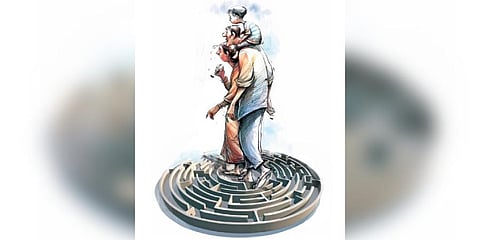

CHENNAI: "Why me? What have I done wrong? My child was doing everything fine. How come he regressed? Till one year, he achieved his milestones,” these thoughts troubled Lavanya Ashok when her son Aprith was diagnosed with Autism Spectrum Disorder (ASD).
Acceptance arrived in 10 long days, and through trial and error, the now-project coordinator at V Excel Educational Trust has gradually understood the intricacies of the teen’s behaviour and the importance of independence and observation.
Much like 19-year-old Arpith, data reveals that at least 2 million people were diagnosed with ASD, and the numbers are on the rise. ASD is a group of developmental disorders characterised by difficulties in social communication and interaction. Distress, depression, anxiety, and other mental or physical health issues are the common issues the caregivers face while caring for a child with autistic spectrum disorder, explains a study titled Challenges of the Caregivers in Managing a Child with Autism Spectrum Disorder – A Qualitative Analysis published in Indian J Psychol in 2021.
Employed as a project coordinator, Lavanya urges parents not to lose hope but accept their situation. As a “strong-headed and ambitious mother”, she says she believes her son can do more and this has brought them a long way.
When Arpith was 14 years old, a teacher referred the teen to try art therapy. Now, his paintbrush speaks on a blank canvas — from a long winding path lined with wiry trees, a picturesque scene of two houses with the mountains in the background, and a sunset oozing out multi-coloured light on a landscape. Terming it a miracle, Lavanya mentions, “Somewhere our therapies have worked because he does not understand boundaries or lines on a page but he paints.”
Of diagnosis and distress
“Even during my journey with my son and with my job, I see parents demotivated and drained, we must understand that if we are going to be like this, who will take care of our child? I must accept that yes, the child has chosen me as the mother and we must give them the best,” explains Lavanya. The journey with the child is enriching, adds the parent.
Apart from social pressures, and lack of emotional support from the family, parents face a roadblock as even the medical field skims past the diagnosis of ASD. As for T Uma, she knew something was wrong when her second son, Prasad, didn’t have a loud cry like other babies and later, would rarely sleep and stiffen when held. “After three years we took him to an assessment and doctors were not aware of what was happening. By seven months, he was not responding to sounds the right way. Another doctor said it would settle down in two years,” she says, adding that ENT doctors and even those at Shankar Netralaya could not provide answers. “They didn’t listen to me and said nothing to worry about. Even my husband had the same view that I’m bluffing.”
A parent and psychiatrist, Gayathri Sridhar reports that reading up and maintaining a log helped her cope with the situation and keep track of the emotions of her son, Anirudh Hariharan. “Till he was seven years, every day before we went to sleep, I would document his emotions and actions in the log. I grew up along with him, there was a paradigm shift,” she says, adding that she slowly accustomed him to social situations and trips during vacations by routinely making him used to it, Gayathri now runs Kalpavriksha, a skilled unit with ideas of independence at its core, empowering children on the spectrum to decide how their lives can be, and showing parents that control is not the route to caring.
Sensitisation, govt intervention
Uma mentions that caring for a child on the autism spectrum can be expensive considering education and therapy. “If some trust or the government takes initiative to set up homes, parents in low-income families can get out of this emotional insecurity.” Gayathri, too, adds that caring for children on the spectrum is financially taxing — when Anirudh was in a matriculation school with a hired para teacher their yearly educational expenses were Rs 1.5 lakh.
While awareness of ASD is more prevalent, sensitisation and data on ASD still lag. “If a child with autism is using public transport, how much will the driver and conductor be sensitised on how to behave with a child with autism? Often the child’s behaviour gets miscommunicated as weird behaviour. To the general public, if they see a child having a public meltdown,” says Lavanya. Echoing other parents, she adds that people with ASD are of the community and it is the latter’s responsibility to take care of them too.
As Gayathri says, while parents may feel it is the end, it is just the beginning of the parents’ journey. “I have a gut feeling in the next 40-45 years, people manning companies in CEO positions will be people on the spectrum,” signs off Lavanya.
Gayathri Sridhar, teacher and parent to Anirudh
Don’t isolate yourself. Take them proudly to family functions or other social gatherings
See their strengths and understand what they are
Don’t turn to religion to fix your problems, that will not fix anything
Parents are not alone, try to stay well-connected with people as it will
Be well informed about Autism Spectrum disorder
Don’t force your child to do anything
Be empathetic
RV Raghavan, accountant and parent to Supraja
Don’t get angry or hit the child
Put them in good educational institutions
It may be challenging but treat them as you would a child who is not on the spectrum
Pay attention to them